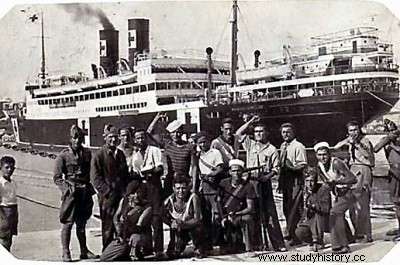
At this time when old Europe is splitting into two hostile camps, the tragedy which has just broken out in Spain, a harbinger of the great confrontation, is polarizing convictions and emotions, hatred and enthusiasm.
From the first days of the civil war, the Spanish Republic spontaneously received the assistance of a few foreigners residing across the Pyrenees or who were there as visitors:A British artist, Felicia Brown, an Austrian, Mechter, fell first in the ranks of the popular militias. From July 23, eleven Germans, including three women, are fighting in Aragon. In the first week of August, a dozen Italians, fifteen Frenchmen and three Britons, including Darwin's grandson, crossed the border and enlisted.
As formerly the German Anacharis Cloots had come to serve Jacobin France, as Lord Byron, although insignificant, flew to the aid of Greece, as Garibaldi had offered his sword to Gambetta, as Jaroslaw Dombrowski had rallied the communards of 1871, they came out of idealism.
The aid given to Franco's troops by Hitler and Mussolini soon brought a few hundred others:those who, rare, were able to flee, hatred in their hearts, German concentration camps or Italian prisons; those of the countries of Central Europe where military dictatorships prevail; those in democratic countries who try to prevent fascism from spreading.
These first fighters come from all walks of life. Interviewing foreign volunteers, a reporter counts among them a labourer, a lawyer, a turner, a bank employee, a carter... He distinguishes a student from Chicago, an Albanian professor, a Swedish doctor, a metalworker from Billancourt... He sees anarchists and Christians, Communists and Trotskyists, Rooseveltians and socialists, members of the Labor Party and the peasant leagues of the Balkans rub shoulders. As the political spectrum of the Spanish militiamen is almost as variegated, the foreigners, rather than grouping themselves by language, disperse, at first, into the various units which correspond best to their sympathies.
In the Spain of July-August 1936, the army went almost en bloc to rebellion. And since, under the republic as under the monarchy, the army had remained the backbone of the state, its reversal deeply weakened the authority of the latter.
